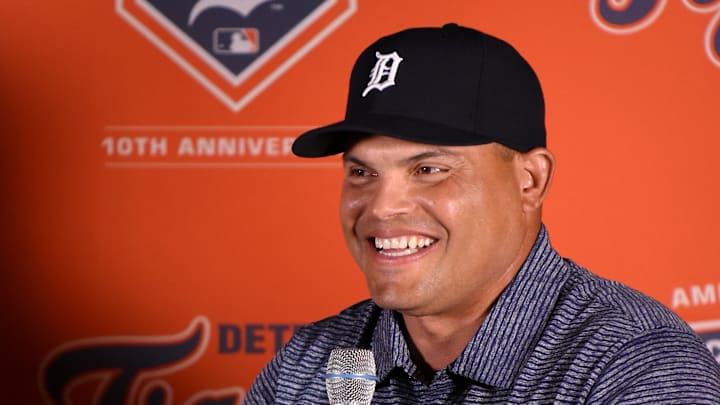To some, the headline “Celebrating the Anniversary of the Detroit Tigers Signing Ivan 'Pudge' Rodriguez” may seem unusual. After all, it commemorates the signing of one player, not a championship victory. However, for fans who recall the period following the 1980s' glory days, this event marked the first ray of hope after a long period of decline.
Heading into the 2004 season, the offseason felt distinctly different. Dave Dombrowski, had begun the process of rebuilding the ball club from scratch. Baseball America's top 10 Tigers prospects for the 2004 season included nine players acquired by Dombrowski.
The efforts to enhance the roster began with trades for Carlos Pena, Jeremy Bonderman, and Alex Sanchez. The Tigers' dismal performance in 2003 made change inevitable, but the significant shift came when Detroit decided to invest heavily, opening up the checkbook as the primary source of transformation.
The signing of Rodriguez was a marquee event, but it also marked the beginning of a series of offseasons where the Tigers consistently engaged in significant hot stove activity. Unlike the previous approach of trading players in search of a solution or budgetary reason, often seen during the tenure of former Tigers GM Randy Smith, Detroit's strategy was backed with spending on building a competitive team.
The build up before Pudge
December 2003: 2B Fernando Vina, OF Rondell White, RHP Jason Johnson.
January 2004: Traded prospects Juan Gonzalez and Ramon Santiago for shortstop Carlos Guillén.
Rumors began circulating in early January after Rodriguez rejected a three-year, $24 million deal from the Marlins, who were fresh off their World Series victory over the Yankees. The Tigers then made their move, proposing a four-year, $40 million contract. Agreement on the length of the deal was reached quickly, but negotiations between Rodriguez's agent, Scott Boras, and the Tigers extended throughout the month. Meanwhile, Rodriguez participated in the Marlins' team tour of the White House.
Burned too many times before
While negotiations with Rodriguez were ongoing, the Tigers proceeded with their offseason plans, expecting Brandon Inge to be the regular everyday catcher. Meanwhile, sports radio and the early days of the online message boards were abuzz with debate: Was Pudge worth the money? He is just using the Tigers for leverage for a better deal?
The debate over Rodriguez's potential signing was intensified by memories of the Tigers' past high-profile acquisitions that did not pan out as expected. Fans vividly remembered the case of Dean Palmer, the third baseman who was signed to a five-year, $35 million deal but failed to live up to expectations due to neck issues that affected his performance in his final three seasons with Detroit.
Additionally, the controversy surrounding Juan Gonzalez, who made it clear he did not want to play in Detroit and rejected an eight-year, $140 million offer from the Tigers, loomed large in the minds of fans. Concerns were also raised about Rodriguez's health, specifically the herniated disk in his back that caused him to miss significant playing time in 2002.
Even the players on the roster spoke about the potential that Pudge could join the team. A lot stood behind Brandon Inge, who was the team's starting catcher.
"If we get Pudge, cool", Young said during Tigersfest at Joe Louis Arena back in January 2004. "but I want Inge behind the plate. If it changes, I have no control over that, but me, myself, I want Inge behind the plate."
No more the bridesmaid
For years leading up to 2004, being a Tigers fan felt akin to cheering for the perpetual underdog, one that never seemed to find its moment in the sun. My teenage years bore witness to this frustration, having never seen the Tigers clinch anything of substance. While I was only an infant when they triumphed in '84 and just barely in elementary school by '87, my formative baseball memories were not of World Series parades but of players like Mickey Tettleton, Cecil Fielder, and the waning days of Sparky Anderson's efforts to cobble together a competitive squad.
Adding another layer to my sports allegiance, where I grew up in Michigan, the Braves were the team of the hour, largely due to pitcher Steve Avery, a local hero from Taylor John F. Kennedy High School. This context made the Braves the popular team among my peers, further isolating my support for the Tigers. Thus, the prospect of signing Pudge Rodriguez offered a sliver of hope amidst years of underwhelming performances, promising a shift that felt more significant than any individual season's fleeting success, given the barren landscape of victories in my lifetime.
The day the Tigers signed Rodriguez marked the start of something big, a shift toward getting the team back on the map. After years of ups and downs—mostly downs—landing Pudge wasn't just a win in the off-season; it was a sign that things were about to change. Sure, it was one player coming aboard, but Pudge brought more than just his stellar record; he brought a vibe, a winner's attitude that the Tigers desperately needed.
This move was the Tigers telling everyone, from the fans to the rest of the league, “We're serious about making a comeback.” And slowly but surely, with Pudge leading the charge, the Tigers began to claw their way back to being a team others would think twice about before writing off. So, in a way, signing Pudge wasn't just about getting a great player; it was the first step on the road back to respectability for the Tigers, showing that they were ready to turn the page and start a new chapter.
Follow me on "X" at rogcastbaseball and check out the Motor City Metrics and Detroit Tigers Minor League Report podcasts on YouTube, Apple Podcasts or wherever you listen to podcasts.
